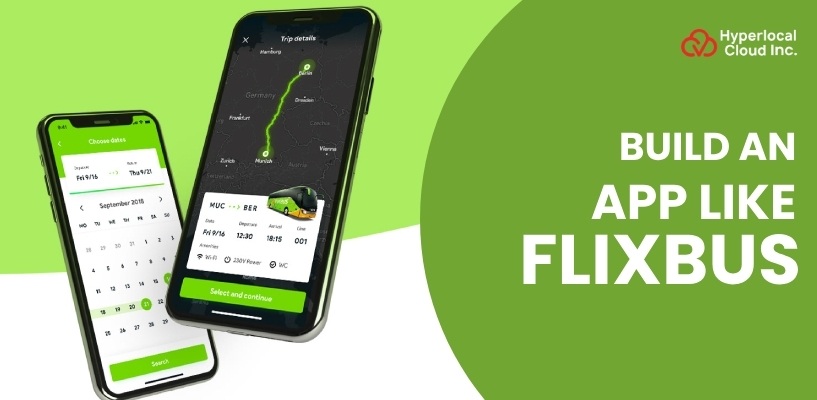FlixBus Clone App: Build an App Like FlixBus

Build a bus ticket booking app like FlixBus with top-tier features and functionalities. Hire our talented developers, who will help you build a ready-to-deploy platform at affordable prices. We will even offer assistance in case of customized solutions depending upon the project requirements. Kickstart your business with us and skyrocket your profits to the ultimate level.
What Is A Flixbus Clone?
In 2021, Flix acquired Greyhound and extended its network to 1800+ destinations across the USA. It has made travel extremely easy and successfully connected various parts of the world.
Flixbus is an online bus booking platform offering amazing intercity services in different parts of Europe, North/South America, and India. The in-built platform replicates all the attributes of the original application and offers the cheapest booking services to passengers. There is a much broader range of travel options that exhibit eco-friendliness and convenience.
Flixbus is the most popular application among its users. Diving into this industry will bring more audience and upscale your ROI. The users can compare the prices in advance and, based on that, make booking decisions. The company provides passengers with flexible fares and enables them to book their tickets in advance or at the last minute.
Build A Bus Ticket Booking App For Accelerated Profits.
FlixBus Clone App: Salient Features
For Passengers
Booking Attribute: Allows the passengers to book their rides with the help of advanced tools while comparing the prices, checking availability, etc.
Real-time Tracking: Helps track buses in real-time via GPS, making it easy for passengers to track their journey and time of arrival, thereby avoiding waiting time at the bus stop.
Route & Schedule Information: Provides a complete route map and updated schedule, enabling passengers to efficiently plan their trips. They can also view the stops and possible delays or schedule changes in real-time.
Seat Choice: Enables passengers to prebook their favorite seat ahead of boarding, seat choice, and other amenities like extra legroom, power outlet, etc.
Carry Baggage: The app shows and informs passengers about the limits regarding size and weight so that passengers are not shocked during boarding.
Push Notifications: Informs the passengers about any change in departure time by the bus, any changes by the gates, or any delay through instant alerts.
Discounts & Promotions: The FlixBus clone app provides discounts, loyalty programs, and special offers to passengers that reduce travel costs for frequent travelers.
For Admin Panel
Intuitive Dashboard: Shows the key metrics, including ticket sales, bus availability, occupancy rates, and revenue tracking, which helps monitor operations more efficiently.
Route Management: Add, modify, or delete bus routes, edit schedules, and update departure times, thereby aligning the routes with passenger demand and ensuring that routes optimize operational costs.
Ticket Sales Monitoring: Admins can see ticket sales in real-time, with details on seat occupancy, booking trends, and regional performance. These details help adjust pricing and promotions.
Customer Support Integration: With this feature, employees can attend to complaints, queries, and requests, increasing speed and quality of service.
Driver & Vehicle Management: Allows the admin to check the vehicles under their maintenance record; this ensures that the buses are in good condition and accompanied by the proper driver, enhancing service reliability.
Payment Management: Allows admins to process payments, handle cancellation requests, manage refunds, monitor payment history, and rectify financial discrepancies promptly.
Analytics & Reporting: Enables admin to prepare detailed reports on ticket sales, passenger demographics, and financial performance and helps streamline business operations to achieve profitability and growth.
Build a bus reservation system and take your business to the heights of success.
Bus Ticket Booking App Development: Ultimate Advantages
For Passengers
Low Cost: The Flixbus clone app provides the cheapest travel alternatives to passengers, which results in excessive cost savings.
Convenience: Passengers get a broader spectrum of traveling options that too at their convenience.
Comfortable Seating: The passengers are provided with the most comfortable seating arrangements and maximum legroom.
Wi-Fi Access: The application provides users with a free Wi-Fi facility to help them stay connected with the world.
Onboard Entertainment: Through the Flixbus clone app, passengers can gain access to their favorite TV shows and movies while traveling.
For Businesses
Revenue Stream: The app features easy ticket booking, which results in increased sales due to its broader reach. It allows passengers to quickly find, book, and pay for tickets, positively affecting ticket sales and revenue per trip.
Cost Efficiency: It reduces the overheads of printing tickets and carrying out activities regarding delivering conventional face-to-face customer services through a digital-first platform.
Automated capabilities comprise self-service functions, which involve managing bookings, making payments, and sending notifications. These functions reduce the need for a workforce and improve business management.
Data-Driven Insights: The app collects relevant user information, such as booking patterns, personal preferences, and demographic facts. This helps identify routes through which it can further optimize, adjust its pricing, and create specific marketing strategies to boost profitability.
Superior Customer Experience: Real-time tracking, efficient bookings, and mobile ticketing increase customer satisfaction for repeated purchases and loyalty purposes. These positive experiences attract better retention rates.
Scalability and Operations: An app like FlixBus can easily scale by allowing the operation to automate and handle various routes and passengers simultaneously.
Dynamic Pricing: The FlixBus clone app allows dynamic pricing, and discounts, promotions, and loyalty programs can be rolled out to attract more passengers. This pricing strategy helps maximize seat occupancy and ensures revenue is optimized based on demand.
Real-Time Operations Management: This will also encompass real-time data on routes, buses, and occupancy to manage the fleet effectively and eliminate operational inefficiencies. This will further curb delays since information is communicated to the passengers, and schedules are adjusted whenever necessary.
Global Reach and Market Penetration: The FlixBus app introduces expansion across geographical boundaries by offering a simplified, standardized platform that maximizes market penetration and drives growth in international business.
Ready To Launch A FlixBus Clone App?
Steps To Build An App Like FlixBus
Market Research
Research the current bus booking market and identify core features and customer preferences. Analyze the sector’s unique selling points of FlixBus, competitors’ apps, and emerging trends to see what goes well in the industry. Such research helps define critical requirements, prioritize features, and align with business objectives.
After that, create a detailed requirement document that includes the essential functionalities for user registration, route planning, seat selection, booking, and payment. The app’s needs should now be carefully addressed through efficient responses to needs presented before the competition and users’ friendliness towards such an app from day one.
UI/UX Design
The wire-framing and proto-typing put everything in visual form, creating smooth navigation, effortless booking, and prominent visuals to look at that thing much like Flixbus did. Ensure accessibility standards for all users to easily navigate and operate the app. Run usability testing on prototypes, get user feedback, and adjust them to make the most transparent and engaging application possible. Simplify the process with a user-centric design that will make booking easy and enjoyable to retain and satisfy users better.
Frontend Development
This stage involves creating a user interface directly related to the user. Hence, the app is employed to work on iOS and Android using cross-platform compatibility, such as React Native or Flutter. The developers write the designs into a responsive, dynamic user interface with booking, seat selection, and payment gateways.
Optimize for minimal load times, responsiveness, and visual consistency; keep critical features, such as route mapping and seat availability, working smoothly. This step is all about creating a fun and functional user experience that increases the app’s overall satisfaction and usability.
Backend Development
Data management, user authentication, trip scheduling, and booking management are well handled in backend development while building an app’s core infrastructure. Scalable technology stack: Use Node.js or Django to deal with thousands of users and transactions. Databases: MySQL and PostgreSQL are set up for the safe storage of user data, booking history, bus routes, and payment records.
The stage also includes implementing RESTful APIs, which will help couple the application’s front and back end. The aim is to exchange data and provide functional responses, i.e., the application works fine and can scale with demand.
Quality Assurance
Conduct comprehensive testing unit, integration, and user acceptance testing before product launches. Test the modules: registration, booking, payments, and tracking for bugs, performance bottlenecks, and security vulnerabilities. It is important to use automated testing tools to speed up the process and ensure consistent results.
Beta testing with real users will be used to find usability flaws and make final adjustments. Thorough quality assurance is crucial to releasing a bug-free, reliable app with high performance and usability standards, ensuring a great user experience.
Release and Deployment
Distribute the app to the Google Play Store and Apple App Store in compliance with their approval procedures. Prepare the app’s description, screenshots, and other metadata before launch to attract users to the app. Utilize CI/CD pipelines to make the release more automated, hence easier to update in the future.
Publicize the launch through social media, email campaigns, and partnerships to increase downloads on the initial release. Monitor the app performance and user feedback after its launch to identify bugs and areas for improvement. With a smooth deployment and the right promotional strategy, the app can gain traction among its target audience.
Post-Launch Maintenance
Regular maintenance guarantees that the app is up to date with the latest feature updates, security patches, and performance optimizations. A monitoring system should be configured to track app usage, crash reports, and user feedback. Based on what has been learned, release updates, such as correcting bugs, enhancing performance, and adding new features.
Maintenance also involves keeping up with the OS to avoid compatibility issues. Such continuous updates reflect engagement with satisfaction from the users and maintain competitiveness in the app market. Improvement in constant need for the users boosts loyalty and even long-term app usage.
Get in touch with our experts and build a bus ticket booking app that will boost sales and skyrocket your business.
Revenue Model For An App Like FlixBus
There are several money-making opportunities that are associated with building online bus booking system. Take a look below;
Commission Fees
The app owner can charge a specified “%” in commission fees for every ticket sold, helping generate a fabulous revenue stream.
Premium Listing Fees
The bus operators need to pay a certain fee from the bus operators to showcase their services at the top in front of the customers.
In-App Ads
Offering dedicated spaces on the platform for third-party service providers to show their services helps generate additional revenue.
Subscription Model
Access to online priority booking, discounts, and offers are made available to the users for a certain amount charged, adding to revenue generation.
Factors Affecting Flixbus Clone App Development Cost
The estimated cost ranges from $10k to $40k, depending on the project requirements. Several factors influence the budget, some of which are illustrated below;
Customization
The features, design, and functionalities are added according to the client’s needs to elevate the prices accordingly. The more personalization, the larger the app budget.
Post-Launch Support
After the Flixbus clone app is built, it’s crucial to maintain the platform. Bug fixation, update, and other improvements require effort; based on that, the cost varies.
Location Of Developers
Geo Setting plays a pivotal role in setting the budget. For instance, hourly charging rates in North America are higher than in Asian and European countries.
Looking For A Bus Ticket Booking App Development company?
Why Choose Hyperlocal Cloud For The Flixbus Clone?
We are renowned for delivering top-notch clone app solutions to businesses worldwide. Our vetted team of developers has built various applications with high-end features and designs.
Result Oriented approach
We adopt a result-oriented approach, ensuring businesses focus on their goals and make data-driven decisions that increase productivity.
Industry Experience
We have years of experience in the IT field, having worked in various domains and provided assistance across industries.
Tech Expertise
Our developers are well-adept in advanced technologies and have a better understanding of the client’s requirements.





